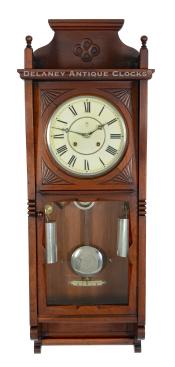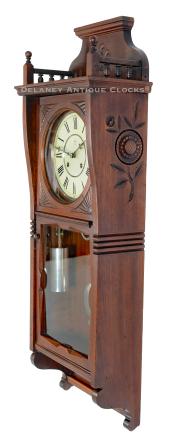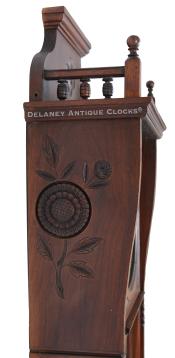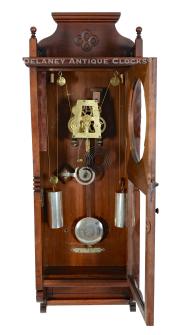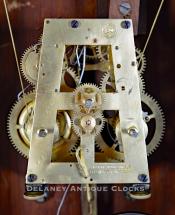Seth Thomas, Flora wall clock. Weight driven. 223183.
The Seth Thomas Clocks Company of Thomaston, Connecticut, made this attractive wall clock.
This very unusual case is constructed in cocobolo, a tropical hardwood that finishes to a lovely reddish-brown coloring. The case form is well-detailed and incorporates steps, shaped moldings, finials, and carvings. The floral carvings located on the sides of the case are reported to have been hand-executed. These unique features add to the aesthetic appeal and contribute to the clock’s value and rarity.
The dial is painted. The Seth Thomas trademark is located in the center. The time ring is formatted with a segmented minute ring and Roman-style hour numerals. The original dial remains in very good condition.
The weight-driven movement features brass trapezoidal-shaped plates that have three large cutouts. The front plate features the Maker’s die-stamp. The shafts are hardened steel. They support the brass gearing and deadbeat escapement. This movement is a time-and-strike design. It will run for eight days on a winding and strikes the hour on the hour on what is referred to as a “Cathedral Bell” that produces a rich, resonant sound. The bellstand is die-stamped with a patent date. A wooden rod supports the pendulum bob. This is decoratively covered in brass, decorated with engravings, and finished in nickel. The two drive weights are brass and feature a silver finish matching the bob.
This clock was made circa 1886. The case is 38.5 inches long, 14 inches wide, and 6.75 inches deep.
Inventpry number 223183.
This clock is sold fully serviced and in excellent working order. The movement has been completely disassembled and cleaned. Areas of wear are addressed while the movement is rebuilt. The movement is then lubricated and tested to ensure its performance.
Seth Thomas was born in Wolcott, Connecticut, in 1785. He was apprenticed as a carpenter and joiner and worked building houses and barns. He started in the clock business in 1807, working for clockmaker Eli Terry. Thomas formed a clock-making partnership in Plymouth, Connecticut, with Eli Terry and Silas Hoadley as Terry, Thomas & Hoadley. In 1810, he bought Terry's clock business, making tall clocks with wooden movements. Seth chose to sell his shares in the partnership in 1812, moving in 1813 to Plymouth Hollow, Connecticut, where he set up a factory to make metal-movement clocks. In 1817, he added shelf and mantel clocks. By the mid-1840s, He successfully transitioned to brass movements and expanded his operations by building a brass rolling mill and a cotton factory. In 1853, He incorporated the business but continued to be the majority shareholder. This clock business expanded until it became one of the "BIG Seven" in Connecticut. Their product line had offerings that competed at every price point, from kitchen clocks to precision regulators. Seth Thomas died in 1859. The community of Plymouth Hollow so revered him that they changed the name on July 6, 1875, to Thomaston in his honor. After his death, his son, Aaron, took over the company's leadership. Aaron is credited with increasing the business by adding a number of new case styles and improving production methods. The company went out of business in the 1980s.

